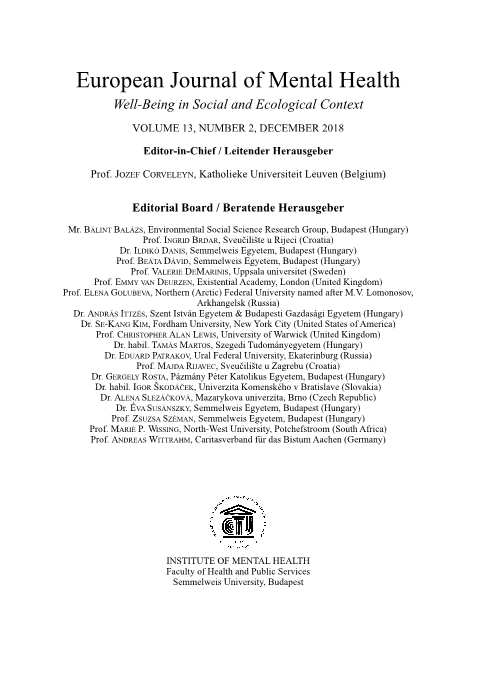Decreasing the Negative Effects of Work-Related Stress in Unchanged Working Environments
Decreasing the Negative Effects of Work-Related Stress in Unchanged Working Environments
Author(s): Adrienne Stauder, Zoltán Cserháti, Barna Konkolÿ ThegeSubject(s): Social Sciences
Published by: Semmelweis Egyetem Mentálhigiéné Intézet
Keywords: work stress; effort-reward imbalance; intervention; depression; anxiety; somatic symptoms; well-being
Summary/Abstract: Background: Chronic work-related stress has a negative impact on both physical and mental health. The present translational study’s goal was to investigate the effectiveness of an individual-focused, standardised coping skills training provided outside the employment setting. Methods: 89 working individuals (76 women, 13 men; mean age: 41.3 years) from diverse occupational backgrounds completed a 12-hour stress management program. Work stress and overcommitment were measured by the Effort-Reward Imbalance Questionnaire (ERI). Outcome variables included perceived stress (PSS10), anxiety- (STAI-T), depressive- (BDI), and subjective somatic symptoms (PHQ15), as well as well-being (WHO-WB5), life meaning (BSCI-LM), coping skills (LSS), and overall life satisfaction. Results: The post-intervention scores showed no change in work-related stress or overcommitment, whilst coping skills improved. Further, anxiety-, depression- and somatic symptoms decreased significantly and there was a significant increase in well-being, life meaning, and life satisfaction scores. These improvements were observed mostly in the subgroup reporting higher initial levels of work stress, associated with higher symptom scores. In the low-stress subgroup, only coping skills, perceived stress, and life meaning scores improved. Conclusions: A short, well-structured multimodal coping skills training can significantly reduce overall stress level and stress-related symptoms, and improve well-being and satisfaction in employees suffering from high work stress even if the work environment remains unchanged.
Journal: European Journal of Mental Health
- Issue Year: 13/2018
- Issue No: 02
- Page Range: 163-183
- Page Count: 21
- Language: English

